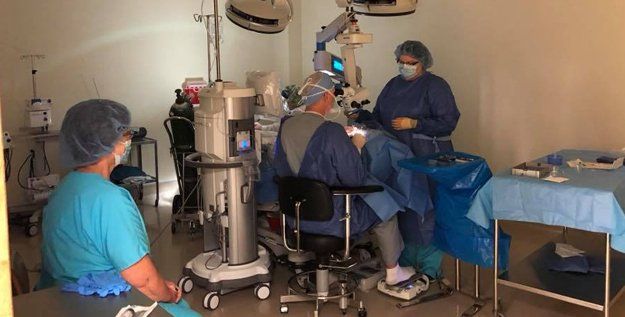Excellence in eye care, close to home.
Visit us on
Toll-Free Number: 1-866-591-4362 (1-866-591-IDOC)
"No Stitch - No Shot" Cataract Surgery
• 24-Hour Emergency Eye Care
• State-of-the-Art Surgery
• Close to Home
What is a Cataract?
The lens and cornea at the front of the eye work together to focus light onto the retina located at the back of the eye, and this produces a clear image. A cataract is a cloudiness that develops over time in the normally transparent lens. Cataracts tend to blur and darken one’s vision. Cataracts can occur at any age. They are more common later in life.
The reason most cataracts form is unknown. Over the years, proteins in the lens tend to clump. This clumping disrupts the passage of light into the eye. The light rays scatter rather than being allowed to focus on the retina.
The breakdown of proteins also leads to a buildup of yellowish-brown pigments. This tends to make colors appear “washed-out.”
Cataracts are painless, but they make your vision dim, blurry, and cloudy.
Symptoms of Cataracts
- Changes in perception of colors
- Frequent changes in eyeglass prescription
- Problems with glare from lamps or the sun
- Difficulty driving at night
- Vision appears cloudy, fuzzy, or foggy or has a “film” over it
- More light is required to read
- Double vision
- Sensitivity to bright lights
Treatment for Cataracts
The lens of the eye can become too foggy to see through. Therefore, the lens is surgically removed and replaced with a clear artificial lens (intraocular lens implant). During an outpatient procedure, with minimal anesthesia, a tiny incision is made in the eye and the foggy lens is removed through the tiny incision. This technique is commonly known as phacoemulsification, or phaco (pronounced FAY-co). This technique uses a probe that sends out ultrasonic vibrations that shatter the cloudy lens into tiny pieces and vacuums them out. An artificial lens (IOL) is inserted through that same incision site. There are usually no stitches. Usually, the entire procedure takes about fifteen minutes.
A cataract cannot return because the lens is entirely removed. However, occasionally after surgery, as long as months to years after, the lens capsule (the tissue bag that supports the replacement intraocular lens implant (IOL) becomes cloudy. This cloudiness can cause the patient to have the same visual symptoms as what was experienced prior to the cataract surgery, making it appear that the cataract has returned. This can be corrected with a minor office procedure called the YAG Capsulotomy Laser.
Cataract Surgery Benefits
The benefit of cataract surgery is that it helps to restore vision. Your quality of life is improved due to the fact that working, reading, performing hobbies, daytime and nighttime driving, and social activities are once again possible.
Cataract Surgery Risks
The risks of cataract surgery are very minimal. It is one of the most commonly performed surgeries in America. Approximately 95 percent of patients have a complication-free surgical experience that results in much-improved vision and quality of life. No surgical procedure is free from risks and complications. Most of the complications usually resolve in a matter of days to weeks. In some rare cases, there could be some loss of vision as a result of the surgery.
Same-Day Office Exam and Surgery
Cape Surgery Center, LLC offers
same-day office exams and surgery. This takes place when your referring optometrist consults with Dr. Cape regarding your potential need for cataract surgery following an office exam. Transportation or other personal issues can prevent a patient from taking a day for an evaluation and another day for eye surgery. Planning ahead and coordinating with the optometrist can result in a patient receiving an office evaluation and eye surgery on the same day. For further details, contact the scheduling technician at Cape Regional Eye Center, PLLC.
For the Area's Best in Cataract Surgery, Call Today
24-hour emergency eye care is available.
(731) 286-2801
The staff at Cape Regional Eye Center, PLLC is dedicated to making your eye care and eye surgical experiences as pleasant and convenient as possible.
With over 25 years of experience, Dr. Cape provides you with the highest quality eye care and eye surgery available in the West Tennessee area.
"Staff is extremely professional, courteous, caring, and knowledgeable."
- Mary Ann Dunn Douglas on Facebook
Frequently Asked Questions About Cataract Surgery
- Does cataract surgery hurt?
The doctor and nurses will apply anesthetic eye drops before and during the surgery. IV sedation will be given in the operating room for relaxation. Usually, you will feel no pain during surgery.
- How long is the procedure?
Most cataract procedures are 10-15 minutes in duration. Dr. Cape will discuss this with you if he feels the surgery will take longer than normal.
- Is an overnight stay required?
The typical stay in the Cape Surgery Center, LLC will be approximately 2 to 3 hours. This includes pre-op preparations, time in the operating room, and time in recovery.
- Will surgery be performed on both eyes at the same time?
Dr. Cape will only perform the procedure on one eye at a time. It is customary to schedule the other eye within one week of the first surgery. Dr. Cape will discuss this during the surgical evaluation.
- What are the restrictions after surgery?
You will wear a protective shield over your eye for the first 24 hours after surgery. Daily activities may resume the day after surgery with only two restrictions. For one week after surgery, you may not lift anything over 15-20 lbs. or bend over for more than a few seconds. You may bend quickly to pick up something, but may not “stay” bent over
- Will medications be used before or after surgery?
Dr. Cape will prescribe eye drops to be used three days before surgery to pre-medicate the eye. After surgery, there is a regimen of drops to use for approximately four to six weeks.
- Will my eye be patched?
Post-operative patients will wear a clear protective shield for the first 24 hours. They are later required to sleep in the protective shield for three consecutive nights.
- Will I be able to eat the morning of surgery?
Do not eat or drink anything for at least 8 hours prior to surgery. On completion of the surgical procedure, you may resume a regular diet.
- Do I have to undress for the surgery?
You are not asked to undress. You should wear comfortable clothing to surgery. Patients are asked to wear either short sleeves or loose-fitting sleeves for easy access for IV insertion and blood pressure monitoring. Do not wear any make-up, lipstick, nail polish, jewelry, face creams, or lotions on the day of surgery.
- Can I drive myself home?
You are not permitted to drive yourself home after receiving surgery. A responsible adult must be present to drive surgical patients home following their procedure.
- Will I see immediately after surgery?
Usually the day of surgery, vision will be blurry or foggy. Dilation from surgery causes blurred vision. Most of the time, by the end of the first day or early the next day, vision will start improving. If your vision is still cloudy or blurry, Dr. Cape will discuss this with you on the follow up visit the next day.
- When can I start wearing makeup again?
Makeup may be worn the next day. Patients are instructed not to wear any eye makeup for at least a week after surgery.
- When can I go swimming?
You may swim in a swimming pool one week after surgery and lake swimming at least two weeks after surgery.
- Can I play golf and mow the yard the next day?
Post-surgical patients should wait at least one week after surgery to resume activities such as golfing, swimming, playing ball, weightlifting, or excessive exercising.
- Will it hurt to rub my eye?
Gentle eye rubbing is permitted, such as blotting the eye. No pressure should be applied to the eye for at least one week after surgery. You may shower or bathe the next day. The surgical eye should be protected from direct contact with any excessive water force from the shower for one week after surgery.
- How often will I have to come back after surgery?
Follow up takes place one day postoperatively, and then at one week, two weeks, four weeks, six weeks, and then three months.



Share On: